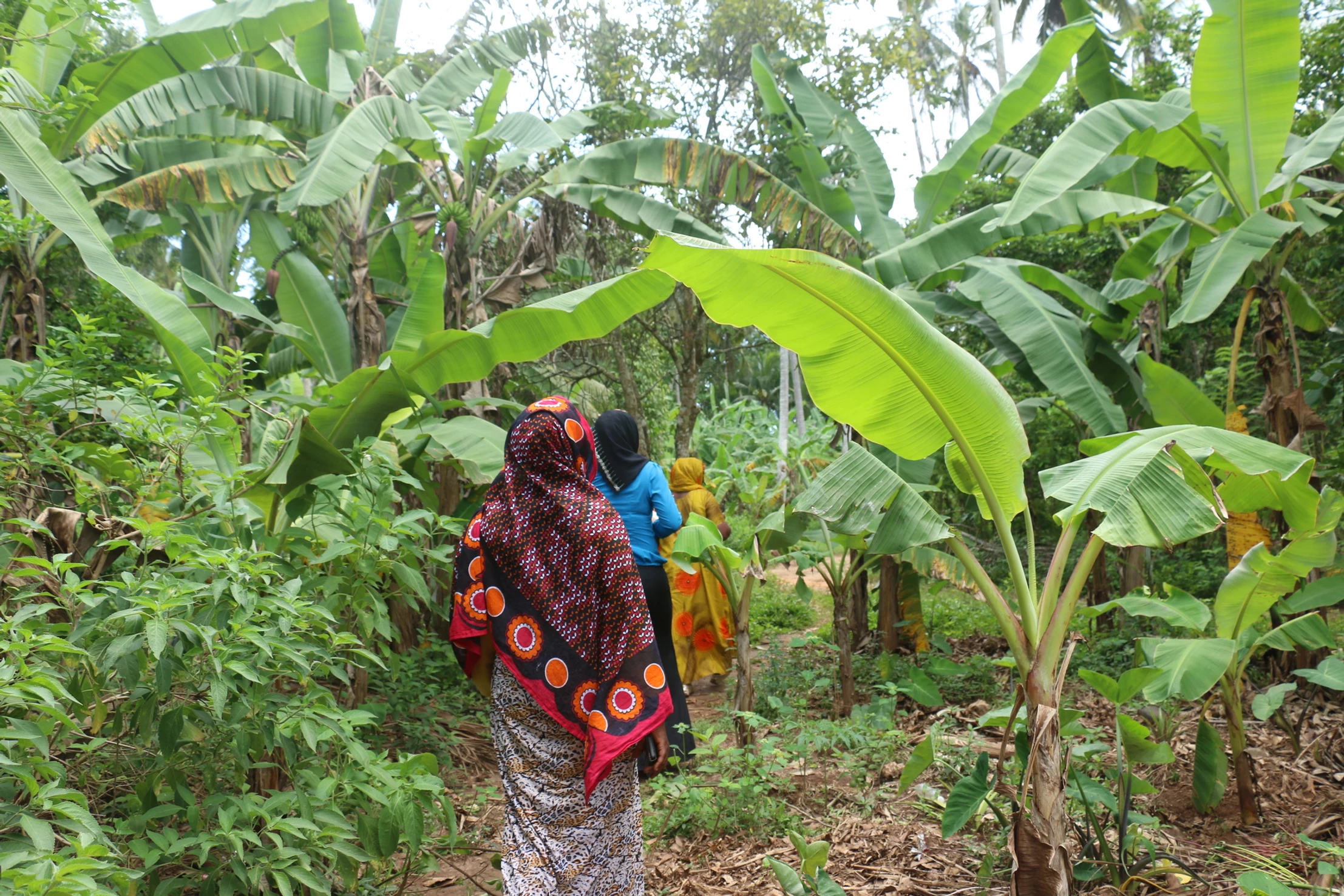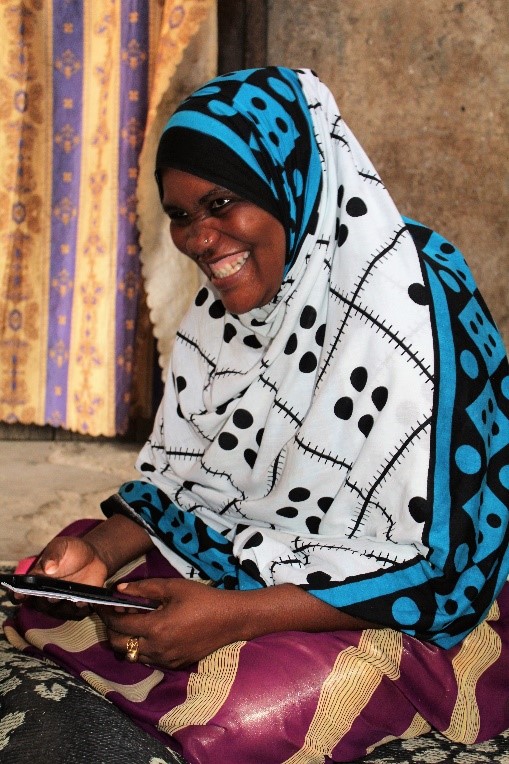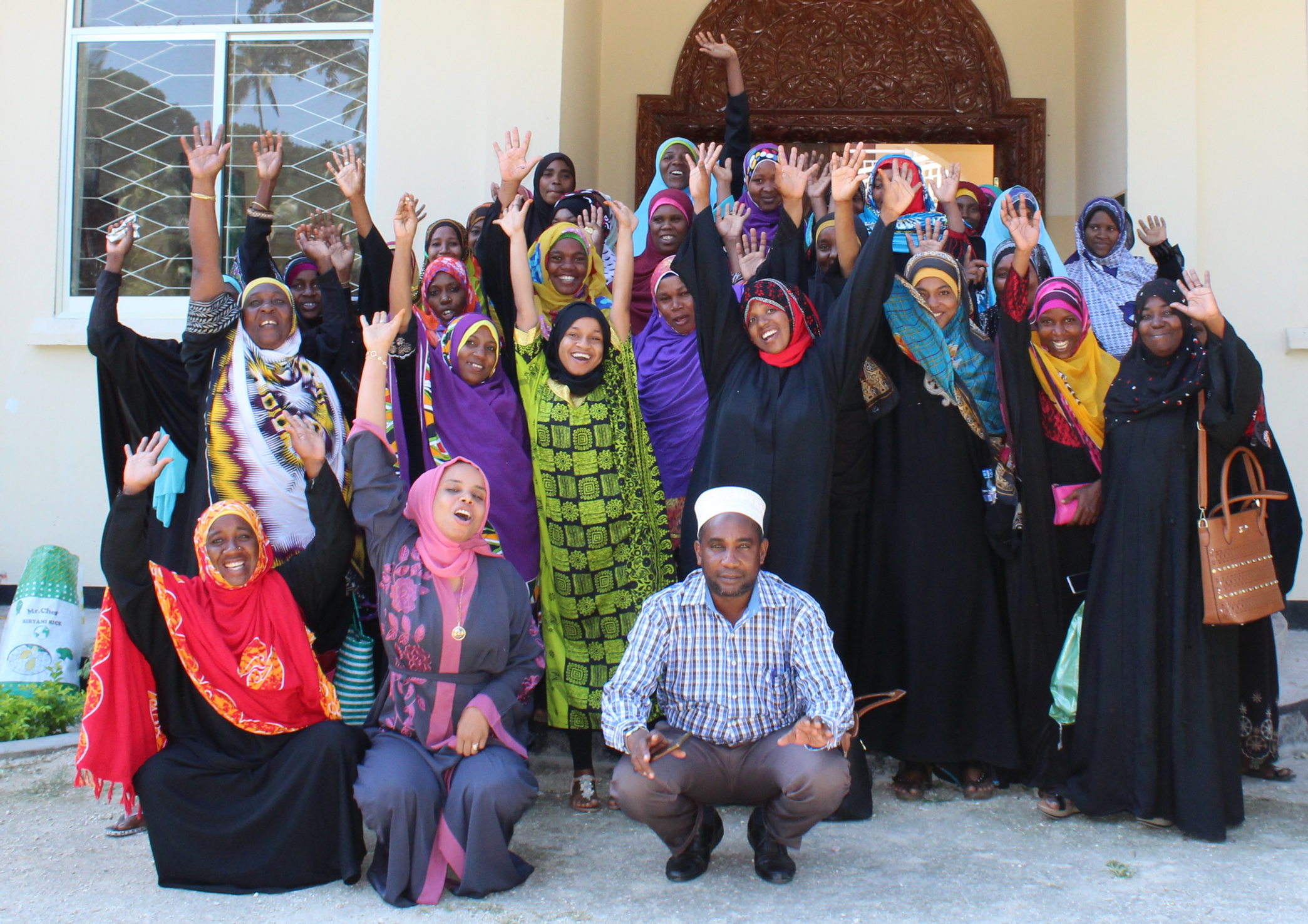Bi Jokha is one of 400 Community Health Volunteers working in Zanzibar with D-tree’s Safer Deliveries Program. Safer Deliveries leverages mobile technology to support CHVs in providing high quality services to pregnant women in their communities. The training, support, and knowledge gained through this digital health program has empowered Bi Jokha to serve as a leader in her community and share lessons learned regarding maternal and child health with her family and community.
There is a shortage of health workers worldwide. This crisis is especially dire in underserved areas, leading many countries, such as Tanzania, to seek out help on a community level, shifting tasks to Community Health Volunteers (CHVs). CHVs are trained, local community members who offer health services to their community, alleviating the burden of health worker shortages. These trained volunteers visit households in their local community to promote access to services, provide health education, facilitate care delivery, and promote healthy behaviors in nutrition, maternal and neonatal health, and more.
In Tanzania, the Zanzibar Ministry of Health has publicly lauded the CHV program for its important role in promoting public health. D-tree International, in partnership with the Zanzibar Ministry of Health, works with the CHVs to help remove the cultural, economic and structural barriers which prevent women from delivering in a health facility. This program, Safer Deliveries, leverages mobile technology to support CHVs in providing high quality services to pregnant women in their communities. The program also seeks to increase attendance at facility antenatal and postnatal care visits as well as increase facility deliveries to ensure that women and infants are healthy during pregnancy and in the critical days after delivery.
In collaboration with the Zanzibar Ministry of Health, the Safer Deliveries program has trained more than 400 CHVs who have been selected by their peers for being role models in the community. The Safer Deliveries training teaches CHVs about maternal and child health and how to use a digital system to bring these teachings and support to the community. Through Safer Deliveries, CHVs have served more than 50,000 pregnant women throughout Zanzibar and work closely with health facilities. With help of a mobile application, CHVs can refer patients and provide necessary follow-up and monitoring at home. Safer Deliveries has seen striking improvements in facility delivery rate and referral completion, with women enrolled in the program delivering in health facilities 74% of the time, compared to the national average of 63% (DHS 2015), and 89%, 81%, and 93% of pregnant women, postpartum women, and newborns referred for danger signs completing the referral, respectively.

Bi Jokha is one of the 400 CHVs working for the Safer Deliveries program and has been described by her neighbors as a caregiver who serves women and children in need and a pillar in her community. Bi Jokha lives Chambani, Zanzibar, a rural community on the island of Pemba off the coast of Tanzania. Before joining Safer Deliveries, Bi Jokha was volunteering at a health facility offering reproductive and child health services and was passionately promoting healthy living to women and children in her community by leading health education groups
When Bi Jokha was selected to become a CHV with Safer Deliveries, her own child was pregnant. Through the training and support that she received from the Safer Deliveries program, and with the help of the mobile application, she learned how to identify pregnancy warning signs, make a birth plan and a savings plan, refer clients with danger signs, and provide counselling to pregnant women on nutrition, HIV/AIDS, and the importance of attending facility antenatal and postnatal care. With the knowledge she got from the Safer Deliveries trainings and with the help of the decision support system, Bi Jokha encouraged her pregnant daughter to attend all antenatal care visits and prepared her for a facility delivery. Bi Jokha also shared these lessons with those around her, improving not only the health of her own family but of other women in the community. The Safer Deliveries mobile decision support system helps Bi Jokha work with pregnant women in her community to develop a birth plan and prepare for facility deliveries.
The training she received from Safer Deliveries inspired Bi Jokha to start and chair a women’s group which meets in her home every week. During the meetings, the women contribute money to a group savings fund. Through this fund, the women apply for loans when needed and help members who are pregnant to save for transport and other hospital expenses. Bi Jokha and her fellow CHVs, who are also members of the group, share health lessons learned during their trainings with Safer Deliveries on maternal health, child nutrition, and family planning.
“Bi Jokha knows about everything, her safer delivery mobile phone has helped us with knowledge on savings, and she can also use her safer delivery mobile to screen pregnant women for danger signs, we are all inspired by her knowledge. “
(Group member and Bi Jokha’s Neighbour, 32)
At home, Bi Jokha’s family members help her with domestic tasks so that she can have more time to devote to being a CHV. They are happy that she works in the health field and that she can share her knowledge with the family. Bi Jokha’s family is thrilled with the use of mobile technology in delivering services to the community.
“My mother uses her mobile phone to screened me on the danger signs when I was pregnant, she was the one who encourage my husband to save money for facility delivery using her safer delivery mobile app.”
(Bi Jokha’s elder daughter, 24)

CHVs are motivated not only by their desire to help the community but also their desire to meet their program targets, which are linked with CHV monthly stipends. With a larger aim of enrolling 80% of pregnant women in Zanzibar in the Safer Deliveries program, Safer Deliveries CHVs aim to register 6 new pregnant women a month as part of the program. These registered clients are more likely to deliver at health facilities because CHVs enrolled in the Safer Deliveries program help them prepare for their child’s birth prior to delivery. During home visits, the mobile system walks CHVs through working with clients to help them make a birth plan, sensitize them on the importance of saving for transport and other unforeseen expenses during delivery, connect them with community drivers who can provide transport, help them make a savings plan, and inform them on the importance of facility delivery.
Bi Jokha is encouraged by the community to meet her monthly targets by getting positive feedback from the families as they encourage women to be registered in the program.
“I think it’s not about me, it’s all about others who inspire and support me, the more they do, the more I perform, the society recognizes you and you get fame and that makes your work easy.”
(Bi Jokha)
Safer Deliveries CHVs are supervised by a health practitioner at a nearby health facility. This close proximity to supervisors allow the CHVs get help immediately if they encounter any problems when registering clients, going through the mobile application, or if they identify a client with a severe danger sign who needs urgent medical attention.
CHVs enjoy working with facility staff. They find the support motivating and helpful in solving client’s problems:
“Supervision from health facility staff has increased trust among my clients. My supervisor helps us with client referrals and helps me with client registrations. Supervisors usually inform women who attend to the facility about Safer Deliveries and why it is important to register in the program and hence women cooperate with the CHV in the community.”
(Bi Jokha)
CHVs who don’t have regular access to electricity receive Little Sun solar chargers from the Little Sun Foundation. These solar chargers allow them to charge their phones and ensures that a lack of electricity doesn’t keep the CHV from participating in the program and visiting clients.
The CHV monthly stipends help with small expenses at home and have made CHVs more determined to complete their work. For Bi Jokha, the monthly stipend has encouraged her to complete her home visits on a monthly basis.
“We are paid based on our performance, my stipend is used for my saving group contribution monthly, hence I always work hard to meet the target so that I maintain my saving amount.”
(Bi Jokha)
Since she was recruited for the Safer Deliveries Program, Bi Jokha has developed friendships and interacts more with her community. She registered and visited more than 105 pregnant women between February 2017 and August 2018, giving referrals when needed and helping women reach health facilities for delivery.
Bi Jokha likes working with Safer Deliveries as she gets the chance to help fellow women in her community.
“If this program would last for a lifetime, then I will work for my fellow women throughout my life. I feel happy when I get an opportunity to help others. I am very pleased when my service as Safer Deliveries CHV helps save a life of a mother or baby in my community. “
(Bi Jokha)


